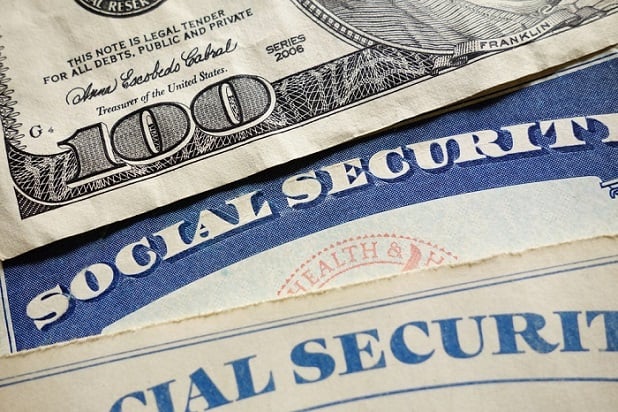 Relying on financial advisers to tell you what to domay be a mistake— often, the ideal claiming decision would cause aclients' investment account balance to drop in the near term,squeezing a source of revenue for financial firms. (Photo:Shutterstock)
Relying on financial advisers to tell you what to domay be a mistake— often, the ideal claiming decision would cause aclients' investment account balance to drop in the near term,squeezing a source of revenue for financial firms. (Photo:Shutterstock)
(Bloomberg) –Almost all American retirees claim SocialSecurity at the wrong time, a new report estimates, whichmeans they will miss out on a collective $3.4trillion in benefits before they die.
|While they can tap their benefits as early as age 62, retireescould boost the size of their checks for every year theywait until age 70, when the maximum benefit accrues.
|The advantage in waiting is substantial: A person eligible for a$725 monthly check at 62 could get a $1,280 check if theywait to start at age 70.
|United Income, a money management firm thatprovides financial advice to retirees, teamed up withformer Social Security officials to simulate retireedecisions on when to claim benefits, along with factors thatinclude income, wealth, taxes, health status andlongevity. Their analysis found that 96% of retireeschoose the wrong year to tap Social Security.
|“People are pretty much doing the opposite of what they shouldbe doing,” said Matt Fellowes, founder and chief executive officerof United Income and co-author of the paper.
|When to take Social Security is a key decision for America'selderly, for whom the program has become a critical safety net.About half of older Americans get most of their income from theprogram.
|Unlike investments and other sources of retirement income,Social Security benefits are guaranteed to keep up with inflationand last for life. That's important when half ofall 65-year-old American women can expect to livepast age 86, according to Social Security estimates. Theaverage life expectancy for U.S. men who are currently65 is age 84.
|The report is based on about 2,000 households that participatedin a long-running University of Michigan study.
|To calculate ideal filing years, United Income estimatedretirees' spending and longevity and ran about 500,000possible scenarios for each participant, including various marketconditions, for a total of about 1.1 billion simulations.
|Only 4% of U.S. retirees are waiting until age 70 to claimSocial Security; some 57% should be doing so, the reportcalculated.
|Meanwhile, more than 70% start taking checks before turning 64,a time when—ideally—only 6.5% of retirees should be cashingchecks.
|The lost income from these less-than-optimal decisions amountsto about $111,000 per household, the researchers estimate.
|The United Income analysis finds little rhyme or reason inAmericans' claiming decisions. If you're healthy andexpect to live a long time, you should maximize benefits receivedlate in life by delaying.
|But the report finds that people don't do this:Those who ended up dying before 75 were just aslikely to have claimed early as those who died after 85. (There isa way to claim benefits, then suspend them until later, but it'skind of complicated.)
|Why are so many people getting it wrong?
|Some retirees might not realize it, but by tapping SocialSecurity at 62 or 63, they're locking in that lower benefit amountfor the rest of their lives. Social Security's rules are alsocomplicated, particularly for married people, and the idealstrategy isn't always obvious. Perhaps that's why four years ago, a384-page book on Social Security-claiming strategies becamean unexpected bestseller.
|What about the theory that, in the end, you'll probably get thesame amount, no matter what you do?
|That's not true for most people, especially since people areliving longer. Other retirement experts have done themath and determined that, assuming you're in reasonablehealth and can afford to wait, you should.
|That's especially true for women, who are likelier to livelonger. Then again, it's not true for people who might dieearlier.
|However, while most people are better off waiting until 70,about 43% of adults would actually be better off claimingbenefits earlier than that, the report concludes. Primarybreadwinners should be waiting until age 70 about twice as often astheir spouses do.
|“Rather than a simple rule of thumb about when to claim SocialSecurity, the optimal decision varies broadly, both across andwithin households,” said Fellowes, a former Brookings Institutionscholar.
|Fellowes said the issue isn't a lack of financial literacy.Indeed, affluent and educated retirees are more likely to make amistake than are poorer and less-educated ones.
|Rather, the problem is that the ideal claiming decision can bevery difficult psychologically. Balancing your savings with SocialSecurity means, in effect, betting on when you are going todie.
|So how does one achieve the necessary balance? The researcherssay the best strategy requires dipping intosavings in your 60s in order to guarantee a larger check lateron.
|By claiming at the right time, more than half of retirees wouldsee incomes in their 70s and 80s rise by more than 25percent. But they would need to have the psychologicalgrit to sacrifice some savings early on—and retirees are oftenreluctant to watch those balances fall.
|“Getting rid of their financial safety blanket is something thatmakes people really nervous,” Fellowes said.
|And relying on financial advisers and wealth managers to tellyou what to do may be a mistake—they might not have your bestinterests at heart. Very often, the ideal claiming decision wouldcause a clients' investment account balance to drop in the nearterm, squeezing a source of revenue for financialfirms.
|If everyone took benefits at the right time, the analysisconcludes, the poverty rate among elderly Americans woulddrop from about 13% to 7%. Meanwhile, the wealthiest 25% ofretirees would get an average 14% income boost over the rest oftheir lives, versus 6% for the poorest quarter of retirees.
|If Americans were more clever about claiming Social Security, itwould also cost the government more. Lawmakers alreadyface a long-term funding gap for Social Security and Medicare. ButFellowes estimates that the cost might be offset a bit byhigher tax revenue from Americans who work further into their60s—assuming they can keep or find a job, given healthissues and age discrimination by employers.
|One way to solve the problem of retirees pulling the trigger tooearly, the researchers say, is legislation.
|“Early claiming should be made an exception, and reserved forthose who have a demonstrable need to claim benefits before thefull retirement age,” the report concludes.
|READ MORE:
|Why Social Security's 2019 COLA will be 2.8percent
|Alicia Munnell: The Social Security fix nobodywants
|Ward off clients' retirement crisis with SocialSecurity talk
|Copyright 2019 Bloomberg. All rightsreserved. This material may not be published, broadcast, rewritten,or redistributed.
Complete your profile to continue reading and get FREE access to BenefitsPRO, part of your ALM digital membership.
Your access to unlimited BenefitsPRO content isn’t changing.
Once you are an ALM digital member, you’ll receive:
- Critical BenefitsPRO information including cutting edge post-reform success strategies, access to educational webcasts and videos, resources from industry leaders, and informative Newsletters.
- Exclusive discounts on ALM, BenefitsPRO magazine and BenefitsPRO.com events
- Access to other award-winning ALM websites including ThinkAdvisor.com and Law.com
Already have an account? Sign In
© 2024 ALM Global, LLC, All Rights Reserved. Request academic re-use from www.copyright.com. All other uses, submit a request to [email protected]. For more information visit Asset & Logo Licensing.








